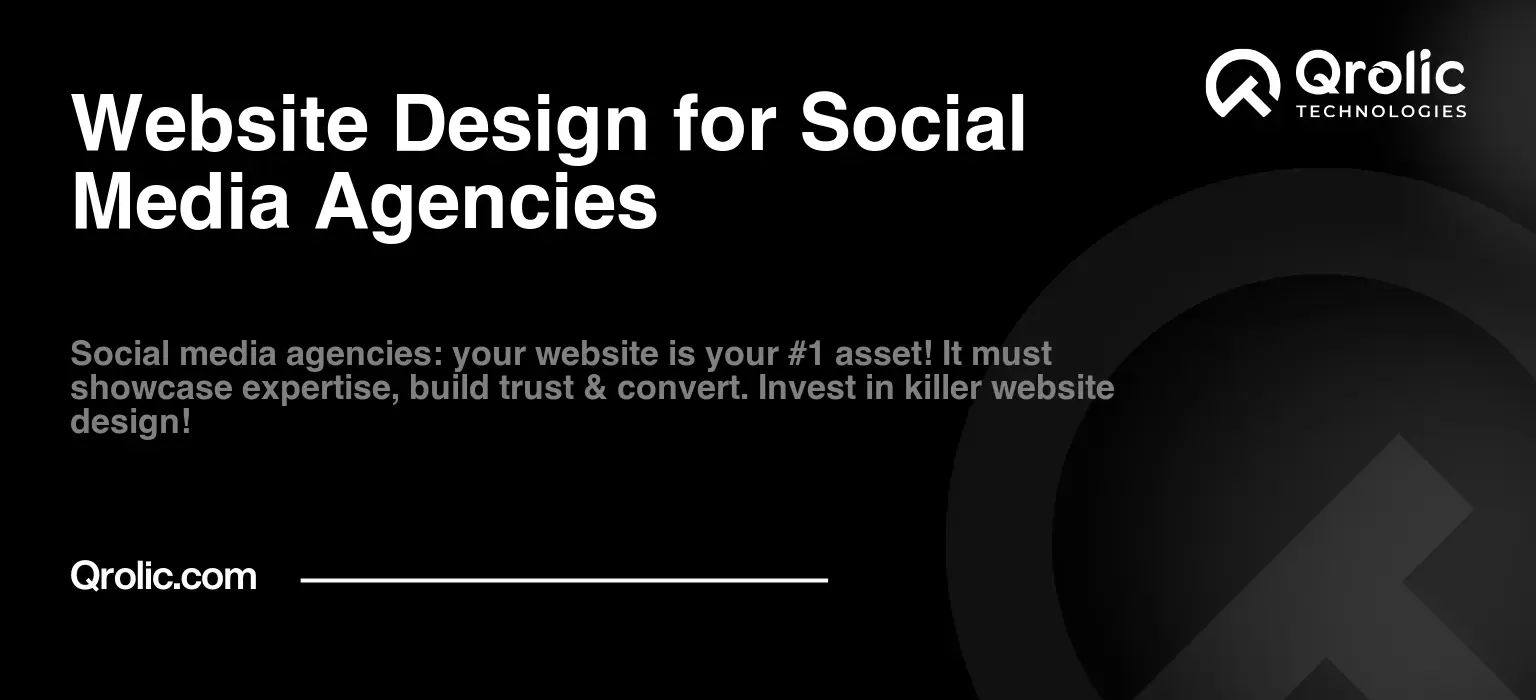Table of Contents
- Why Your Social Media Agency Needs a Killer Website (Beyond Just Looking Good)
- Essential Elements of a High-Converting Social Media Agency Website
- 1. Crystal-Clear Value Proposition: What Problem Do You Solve?
- 2. Stunning Visual Design: A Reflection of Your Creative Prowess
- 3. Compelling Portfolio: Show Off Your Success Stories
- 4. Clear Calls to Action (CTAs): Guiding Visitors to the Next Step
- 5. Engaging Content: Providing Value and Building Authority
- 6. Contact Information and Easy Communication: Making it Simple to Connect
- 7. Client Testimonials and Social Proof: Building Trust and Confidence
- 8. About Us Page: Telling Your Story and Connecting with Your Audience
- Optimizing Your Website for Search Engines (SEO)
- 1. Keyword Research: Identifying the Right Terms
- 2. On-Page Optimization: Making Your Website Search Engine Friendly
- 3. Content Marketing: Creating Valuable and SEO-Friendly Content
- 4. Off-Page Optimization: Building Authority and Earning Backlinks
- 5. Local SEO: Targeting Local Clients
- Website Maintenance and Updates: Keeping Your Website Fresh and Relevant
- 1. Regular Content Updates: Keeping Your Content Fresh
- 2. Security Updates: Protecting Your Website from Threats
- 3. Technical Maintenance: Ensuring Functionality and Performance
- Measuring Success: Tracking Your Website’s Performance
- Key Metrics to Track:
- The Cost of a Social Media Agency Website: Investment vs. Expense
- Choosing the Right Web Design Agency: Finding Your Perfect Partner
- Social Media Agency Website Design and Online Branding Website with Qrolic Technologies
- The Future of Social Media Agency Websites: Trends to Watch
- Conclusion: Your Website – The Digital Face of Your Success
Why Your Social Media Agency Needs a Killer Website (Beyond Just Looking Good)
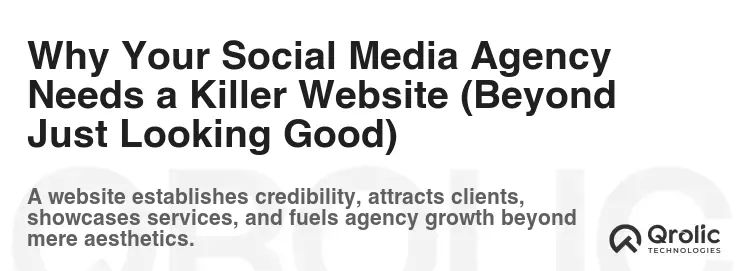
In the fast-paced world of social media, first impressions matter. And for a social media agency, your website isn’t just a digital brochure; it’s your digital storefront, your lead generation machine, and your ultimate brand ambassador. It’s the place where potential clients decide whether you’re the real deal or just another fly-by-night operation.
The Harsh Reality: A poorly designed website screams unprofessionalism, lack of expertise, and frankly, a lack of attention to detail – qualities that are a death knell in the social media world. After all, how can you convince a client you can build their online presence when your own is a mess?
The Powerful Truth: A well-designed website showcases your skills, builds trust, and converts visitors into clients. It’s an investment that pays dividends in the form of increased leads, higher conversion rates, and a stronger brand reputation.
Here’s why your social media agency needs a killer website, explained in human terms:
- It’s Your 24/7 Salesperson: Your website is always working, even when you’re sleeping. It’s constantly showcasing your services, expertise, and portfolio to potential clients around the globe.
- First Impressions Really DO Matter: Studies show that users form an opinion about a website in just 50 milliseconds. You’ve got less than a blink of an eye to capture their attention and make a positive impression.
- Credibility is King: A professionally designed website instantly boosts your credibility and positions you as an authority in the social media space.
- Show, Don’t Just Tell: A strong portfolio, case studies, and client testimonials provide tangible proof of your success and demonstrate your ability to deliver results.
- Lead Generation Powerhouse: Strategically placed calls to action, contact forms, and lead magnets can turn website visitors into qualified leads and ultimately, paying clients.
- Brand Storytelling at its Finest: Your website is the perfect platform to tell your brand story, connect with your target audience, and differentiate yourself from the competition.
In essence, your website is not just a website; it’s the cornerstone of your online marketing strategy and a vital tool for driving business growth. Investing in social media agency website design is investing in your agency’s future.
Essential Elements of a High-Converting Social Media Agency Website
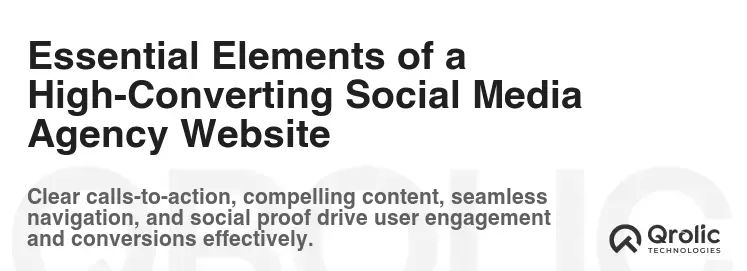
What separates a good website from a great one that consistently generates leads and attracts clients? It boils down to having the right elements in place, designed with your target audience in mind. Think of these as the building blocks of a successful digital marketing web development strategy.
1. Crystal-Clear Value Proposition: What Problem Do You Solve?
This is the single most important element of your website. Within seconds of landing on your homepage, visitors should understand:
- Who you are: A brief and compelling introduction to your agency.
- What you do: The specific social media services you offer.
- Why they should choose you: Your unique selling proposition (USP). What makes you different and better than the competition?
Example: “We help [Target Audience – e.g., E-commerce businesses] increase their sales by [Specific Result – e.g., 30%] using [Your Approach – e.g., strategic social media advertising and engaging content].”
Actionable Tip: Craft a clear and concise value proposition that speaks directly to the needs and pain points of your ideal client. Use strong verbs and focus on the benefits you provide.
2. Stunning Visual Design: A Reflection of Your Creative Prowess
Your website’s design should be visually appealing, modern, and aligned with your brand aesthetic. It should also be user-friendly and easy to navigate. Remember, you’re a social media agency; your website should showcase your design sensibilities.
- High-Quality Imagery and Videos: Use professional photos and videos to showcase your work, team, and company culture.
- Clean and Modern Layout: Avoid clutter and ensure a clear visual hierarchy. Use white space effectively to improve readability.
- Consistent Branding: Maintain consistent use of your logo, colors, fonts, and overall brand identity throughout the website.
- Mobile-Responsiveness: Ensure your website is fully responsive and looks great on all devices (desktops, tablets, and smartphones). This is crucial for SEO and user experience.
- Fast Loading Speed: Optimize images and videos to ensure fast loading times. Slow websites can frustrate users and negatively impact your search engine rankings.
Actionable Tip: Invest in professional web design and development. Don’t try to cut corners; your website is too important to your business.
3. Compelling Portfolio: Show Off Your Success Stories
Your portfolio is your chance to showcase your best work and demonstrate your expertise. Include detailed case studies that highlight the challenges you faced, the strategies you implemented, and the results you achieved for your clients.
- Variety of Projects: Showcase a diverse range of projects across different industries and social media platforms.
- Quantifiable Results: Use data to demonstrate the impact of your work. Include metrics such as increased website traffic, leads generated, sales conversions, and brand awareness.
- Client Testimonials: Include positive testimonials from satisfied clients to build trust and credibility.
- Visual Presentation: Present your portfolio in a visually appealing and engaging way. Use high-quality images and videos to showcase your work.
Actionable Tip: Regularly update your portfolio with your latest and greatest work. Don’t be afraid to brag a little; you deserve it!
4. Clear Calls to Action (CTAs): Guiding Visitors to the Next Step
Every page of your website should have a clear call to action that prompts visitors to take the next step. Whether it’s contacting you for a consultation, downloading a free resource, or subscribing to your newsletter, make it easy for them to engage with your agency.
- Strategic Placement: Place CTAs in prominent locations on your website, such as above the fold, within blog posts, and at the end of service pages.
- Compelling Language: Use strong action verbs and create a sense of urgency to encourage visitors to click. Examples: “Get a Free Quote,” “Schedule a Consultation,” “Download Our Free Ebook.”
- Visually Appealing Buttons: Use visually appealing buttons that stand out from the rest of the page.
- A/B Testing: Test different CTAs to see which ones perform best.
Actionable Tip: Experiment with different CTAs to see what resonates best with your target audience. Track your results and make adjustments as needed.
5. Engaging Content: Providing Value and Building Authority
Your website should be filled with valuable and engaging content that educates, informs, and entertains your target audience. This can include blog posts, articles, infographics, videos, and other types of content that demonstrate your expertise and thought leadership in the social media space.
- Target Audience Focus: Create content that is specifically tailored to the needs and interests of your ideal client.
- SEO Optimization: Optimize your content for relevant keywords to improve your search engine rankings.
- High-Quality and Original: Ensure your content is well-written, informative, and original. Avoid plagiarism and always cite your sources.
- Visual Appeal: Use images, videos, and other visuals to break up the text and make your content more engaging.
- Consistent Publishing Schedule: Maintain a consistent publishing schedule to keep your audience engaged and coming back for more.
Actionable Tip: Create a content calendar to plan your content strategy and ensure you’re consistently publishing valuable content.
6. Contact Information and Easy Communication: Making it Simple to Connect
Make it easy for potential clients to contact you by providing clear and visible contact information on your website. This should include your phone number, email address, physical address (if applicable), and a contact form.
- Dedicated Contact Page: Create a dedicated contact page with all your contact information and a contact form.
- Easy-to-Find Contact Information: Display your contact information in the header or footer of every page of your website.
- Live Chat: Consider adding live chat to your website to provide instant support to visitors.
- Social Media Links: Include links to your social media profiles so visitors can connect with you on their preferred platforms.
Actionable Tip: Respond to inquiries promptly and professionally. Treat every interaction as an opportunity to build a relationship with a potential client.
7. Client Testimonials and Social Proof: Building Trust and Confidence
Client testimonials and social proof are powerful tools for building trust and confidence in your agency. Include testimonials, reviews, and case studies on your website to demonstrate the value you provide to your clients.
- Authentic Testimonials: Use real testimonials from satisfied clients. Avoid fake or generic testimonials.
- Visual Testimonials: Use photos and videos of your clients to make the testimonials more engaging and authentic.
- Third-Party Reviews: Link to your profiles on review sites like Google My Business, Yelp, and Clutch.
- Social Media Mentions: Showcase positive mentions and comments from your social media followers.
Actionable Tip: Ask your satisfied clients for testimonials and reviews. Make it easy for them to provide feedback.
8. About Us Page: Telling Your Story and Connecting with Your Audience
Your About Us page is your opportunity to tell your brand story, connect with your target audience, and differentiate yourself from the competition. Share your mission, vision, values, and the story behind your agency.
- Authentic and Engaging: Write in a conversational tone and share your passion for social media.
- Team Photos and Bios: Introduce your team members and share their expertise and experience.
- Company Culture: Showcase your company culture and values.
- Mission and Vision: Clearly state your mission and vision.
- Why You Do What You Do: Explain why you’re passionate about helping businesses succeed on social media.
Actionable Tip: Don’t just list your qualifications and experience. Tell your story and connect with your audience on an emotional level.
Optimizing Your Website for Search Engines (SEO)
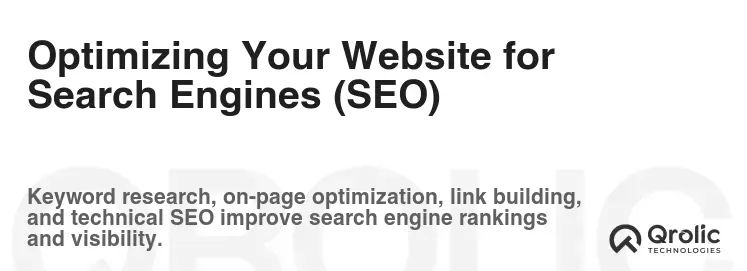
A beautiful website is useless if no one can find it. Search Engine Optimization (SEO) is crucial for driving organic traffic to your website and attracting potential clients. Here are some key SEO strategies to implement:
1. Keyword Research: Identifying the Right Terms
- Identify relevant keywords: Use tools like Google Keyword Planner, SEMrush, and Ahrefs to identify keywords that your target audience is searching for. Focus on long-tail keywords (longer, more specific phrases) that have lower competition. For social media agency website design, relevant long-tail keywords could include: “social media agency website design cost”, “best website design for social media marketing agency” or “affordable social media agency website development”.
- Analyze competitor websites: See what keywords your competitors are targeting.
2. On-Page Optimization: Making Your Website Search Engine Friendly
- Optimize title tags and meta descriptions: Use relevant keywords in your title tags and meta descriptions to improve your click-through rates. Each page should have a unique title tag and meta description.
- Use header tags (H1, H2, H3): Use header tags to structure your content and make it easier for search engines to understand. Use your primary keyword in the H1 tag.
- Optimize images: Use descriptive alt text for your images and compress them to reduce file size.
- Internal linking: Link to other relevant pages on your website to improve your website’s navigation and SEO.
- Mobile-friendliness: Ensure your website is mobile-friendly. Google prioritizes mobile-first indexing.
- Website speed: Optimize your website’s loading speed. Use tools like Google PageSpeed Insights to identify areas for improvement.
3. Content Marketing: Creating Valuable and SEO-Friendly Content
- Blog regularly: Publish high-quality blog posts on topics that are relevant to your target audience.
- Target relevant keywords: Use relevant keywords in your blog posts.
- Promote your content: Share your content on social media and other platforms.
4. Off-Page Optimization: Building Authority and Earning Backlinks
- Build backlinks: Earn backlinks from high-quality websites in your industry. This can be done through guest blogging, outreach, and creating valuable content that others will want to link to.
- Social media marketing: Promote your website and content on social media.
- Online directories: List your website in relevant online directories.
5. Local SEO: Targeting Local Clients
- Claim your Google My Business listing: This is essential for local SEO.
- Optimize your Google My Business listing: Include your business name, address, phone number, website, and business hours.
- Get local citations: List your business in local directories.
Website Maintenance and Updates: Keeping Your Website Fresh and Relevant
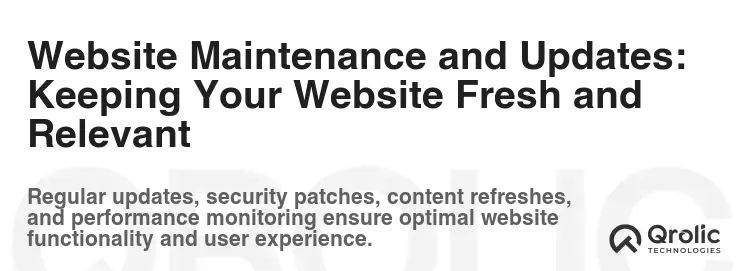
Your website is not a “set it and forget it” project. It requires ongoing maintenance and updates to ensure it remains secure, functional, and relevant.
1. Regular Content Updates: Keeping Your Content Fresh
- Update your blog regularly: Publish new blog posts on a consistent basis.
- Update your portfolio: Add new case studies and projects to your portfolio.
- Update your website copy: Review your website copy regularly and make sure it’s still accurate and relevant.
2. Security Updates: Protecting Your Website from Threats
- Keep your website software up to date: This includes your CMS (Content Management System), themes, and plugins.
- Use a strong password: Use a strong password for your website and all associated accounts.
- Install a security plugin: Use a security plugin to protect your website from malware and other threats.
- Regular backups: Back up your website regularly in case of a security breach or other disaster.
3. Technical Maintenance: Ensuring Functionality and Performance
- Monitor your website’s performance: Use tools like Google Analytics to monitor your website’s traffic, bounce rate, and conversion rate.
- Fix broken links: Regularly check your website for broken links and fix them.
- Optimize your website’s speed: Optimize your website’s loading speed to improve user experience and SEO.
- Ensure mobile-friendliness: Make sure your website is still mobile-friendly and responsive.
Measuring Success: Tracking Your Website’s Performance
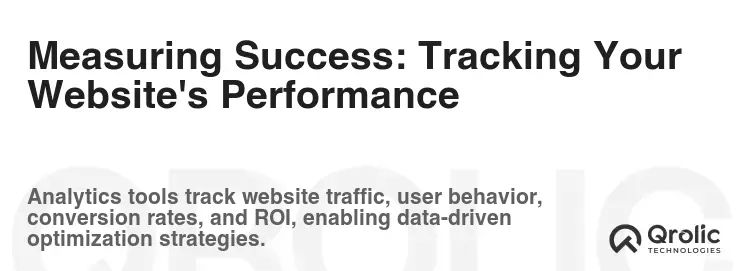
It’s crucial to track your website’s performance to see what’s working and what’s not. Use tools like Google Analytics to monitor your website’s traffic, bounce rate, conversion rate, and other key metrics.
Key Metrics to Track:
- Website Traffic: The number of visitors to your website.
- Bounce Rate: The percentage of visitors who leave your website after viewing only one page.
- Conversion Rate: The percentage of visitors who complete a desired action, such as filling out a contact form or downloading a lead magnet.
- Leads Generated: The number of leads generated through your website.
- Sales Conversions: The number of sales conversions that originated from your website.
- Keyword Rankings: Your website’s rankings for relevant keywords.
By tracking these metrics, you can identify areas for improvement and optimize your website to achieve your business goals.
The Cost of a Social Media Agency Website: Investment vs. Expense
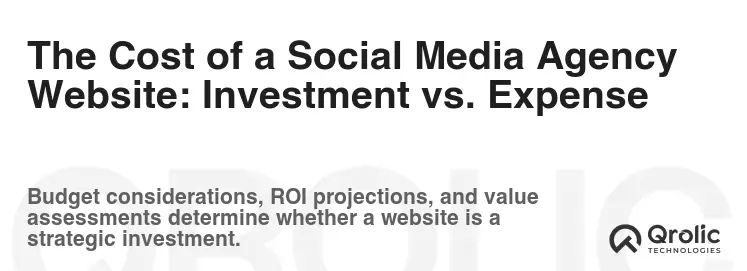
Let’s talk about the elephant in the room: cost. Building a high-quality website for your social media agency is an investment, not an expense. Think of it as planting a seed that will grow into a tree, bearing fruit in the form of new clients and increased revenue.
The cost of a social media agency website design can vary greatly depending on several factors:
- Scope of the project: A simple website with a few pages will cost less than a complex website with custom features.
- Design complexity: A custom-designed website will cost more than a website built using a template.
- Functionality: Adding features like e-commerce, membership areas, or custom integrations will increase the cost.
- Agency or freelancer: Hiring a reputable web design agency will typically cost more than hiring a freelancer, but you’ll also get a higher level of expertise and support.
- Location: Web design costs can vary depending on your location.
General Cost Estimates:
- Basic Website (5-10 pages, template-based design): $2,000 – $5,000
- Intermediate Website (10-20 pages, custom design): $5,000 – $15,000
- Advanced Website (20+ pages, custom design, complex functionality): $15,000+
Remember: The cheapest option isn’t always the best. Investing in a high-quality website will pay off in the long run.
Choosing the Right Web Design Agency: Finding Your Perfect Partner
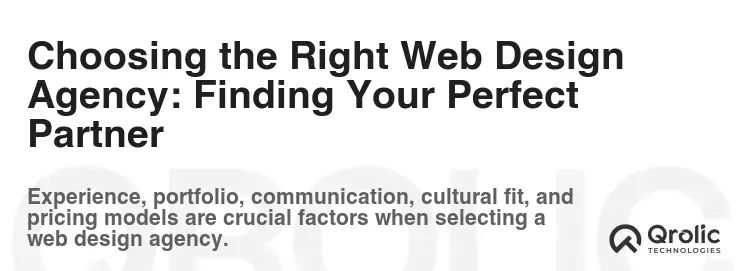
Finding the right web design agency is crucial for the success of your project. Here are some tips for choosing the right partner:
- Portfolio Review: Thoroughly review the agency’s portfolio to see if their design style aligns with your brand.
- Client Testimonials: Read client testimonials to get an idea of the agency’s reputation and customer service.
- Communication: Make sure the agency is responsive and communicative.
- Experience: Choose an agency with experience building websites for social media agencies or similar businesses.
- Pricing: Get quotes from multiple agencies and compare their pricing.
- SEO Knowledge: Ensure they have a strong understanding of SEO best practices.
- Long-Term Support: Inquire about ongoing maintenance and support.
Social Media Agency Website Design and Online Branding Website with Qrolic Technologies
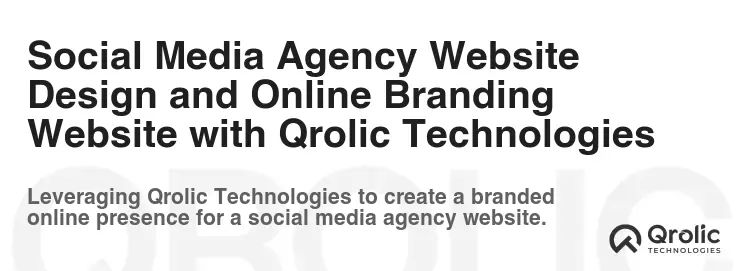
At Qrolic Technologies (https://qrolic.com/), we understand the unique needs of social media agencies. We specialize in digital marketing web development that helps agencies like yours stand out, attract clients, and showcase your expertise.
We offer a range of services, including:
- Custom Website Design and Development: We create visually stunning and user-friendly websites that reflect your brand identity and showcase your work.
- SEO Optimization: We optimize your website for search engines to drive organic traffic and attract potential clients.
- Content Marketing: We create valuable and engaging content that educates, informs, and entertains your target audience.
- Website Maintenance and Support: We provide ongoing maintenance and support to ensure your website remains secure, functional, and relevant.
We pride ourselves on:
- Understanding Social Media: We “get” social media marketing. We understand the nuances, the trends, and the importance of a strong online presence.
- Collaborative Approach: We work closely with our clients to understand their needs and goals.
- Results-Driven Solutions: We focus on delivering results that help our clients grow their businesses.
- Commitment to Quality: We are committed to providing high-quality work and exceptional customer service.
- Affordable Pricing: We offer competitive pricing without compromising on quality.
If you’re looking for a digital marketing web development partner that understands your industry and can help you create a website that truly represents your brand, contact Qrolic Technologies today for a free consultation. We can help you build an online branding website that will set you apart from the competition.
The Future of Social Media Agency Websites: Trends to Watch
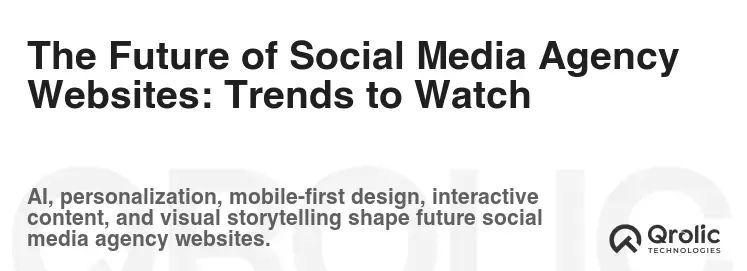
The world of web design is constantly evolving. Here are some emerging trends to watch in the realm of social media agency website design:
- AI-Powered Chatbots: Providing instant support and lead generation.
- Personalized Experiences: Tailoring website content based on user behavior and preferences.
- Interactive Content: Engaging users with quizzes, polls, and interactive infographics.
- Voice Search Optimization: Optimizing your website for voice search.
- Augmented Reality (AR): Offering immersive experiences, such as virtual tours of your office.
- Dark Mode: Providing a visually appealing and energy-efficient browsing experience.
By staying ahead of these trends, you can ensure your website remains cutting-edge and continues to attract clients for years to come. The investment into your website is an investment into future of your company, so make it wisely.
Conclusion: Your Website – The Digital Face of Your Success
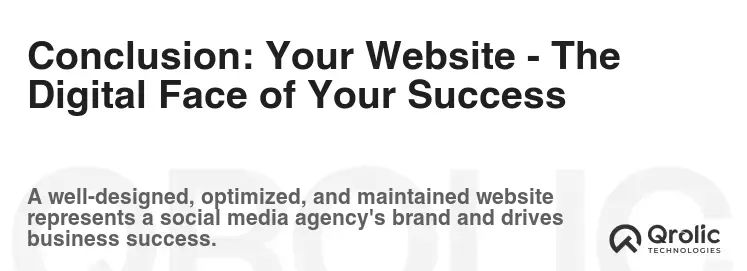
Your website is more than just a pretty picture; it’s the digital face of your social media agency, and it plays a crucial role in your overall success. By implementing the strategies and tips outlined in this article, you can create a website that showcases your expertise, builds trust, and converts visitors into clients. Remember to prioritize user experience, SEO, and ongoing maintenance to ensure your website continues to drive business growth. Invest in social media agency website design today and watch your agency thrive. Your ideal clients are out there; make sure they can find you, trust you, and choose you.

